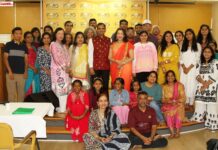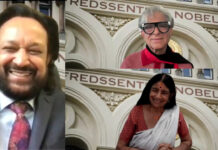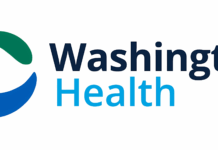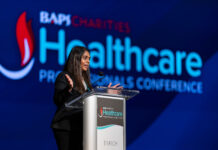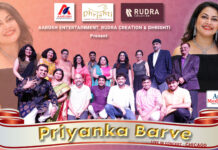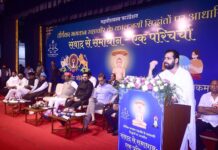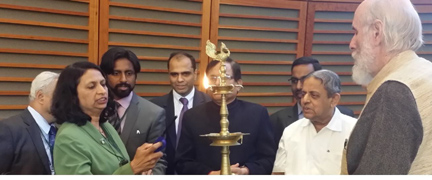
HARVARD: “Heal The Hurt” 2nd International Conference on Integrative Medicine: Role of Yoga and Ayurveda in Pain and Addiction Management was held at Joseph B. Martin Conference Center on May 20-2.
Hundreds of eminent persons, Ayurveda, Yoga and Allopathic practitioners, researchers and academicians from different countries attended the conference. Notable among them were Shripad Yesso Naik, Minister of State, Government of India, Dr. B. R. Nagendra, Chancellor of S-Vyasa, Dr. Nam Pham Assistant Secretary for Business Development, International Trade, State of Massachusetts; Captain Christopher Bersani , Deputy Regional Health Administrator, Federal Health and Human Services and Dr. Vidhu Nair from Indian Consulate in New York.
Efforts were directed to look into how to bridge the age-old rich medical Eastern knowledge with western modern medical system in their future medical model to provide a good healthcare service to the public at large. Although the main focus of this year’s conference was on the Pain and Addiction Management, distinguished scholars, researchers, policy makers and academicians talked about adopting different evidence based strategies for their future medical model.
After energy filled breakfast, on the beautiful morning of Saturday, May 20, all the special dignitaries and organizers with Dr. H. R. Nagendra, Chancellor of S-VYASA and Minister Shripad Yasso Naik inaugurated the function by lighting the lamp with chanting of Vedic Prathanna. The opening remarks were made by Kanchan Banerjee, Co-Convener, Director, Indo-US Health Initiatives and welcome address was given by Dr. Darshan H. Mehta, Medical Director, the Benson-Henry Institute for Mind Body Medicine at Massachusetts General Hospital.
Indian Minister Shripad Yasso Naik, Chief Guest, and Dr. Robert Schneider, Dean and Director, College of Integrative Medicine, Institute for Natural Medicines and Prevention, Maharishi University of Management, IA, presented their thought provoking keynote addresses to the keen audience. Shree Shripad Naik said that the ancient wisdom of Ayurveda is a powerful healing tool. The self-care practices of Ayurveda and yoga tips promote and nourish a better mind-body connection. Evidence based treatment of Ayurveda should be brought into every level of education.
Dr. Schneider stated that the tripod universal principle operators (body, mind, and spirit) of meditation are included in Ayurveda and Yoga. It has a well developed branch of psychiatry, which has clinically proven practices of treating mental ailments and also physical problems associated with psychological imbalances. One of the sponsors of the conference Brenda Cole from the Harvard Pilgrim HealthCare gave a talk on how much their agency is eager to support the introduction of Yoga and Ayurveda in the area of their future medical model. Community Volunteer Pawan Roy offered all the logistics of the conference to the audience for their expediency and practicality.
The first symposium titled ‘Fundamental Science and Clinical Issues’ was chaired by Dr. Dinesh Patel, Emeritus Chief, Arthroscopic Surgery, and Mass General Hospital. Dr. Greg Fricchione, Associate Chief of Psychiatry; Director, The Benson-Henry institute for Mind Body Medicine at Massachusetts General Hospital presented several stimulating findings with regard to the role of yoga and meditation in basic biomedical sciences. Their studies showed that Yoga and Meditation can change a range of genetic and molecular differences, including altered levels of gene-regulating machinery and reduced levels of pro-inflammatory genes, which in turn correlated with faster physical recovery from a stressful situation.
After a delicious lunch break, the Second Symposium of the day titled, ‘Ayurveda and Yoga Therapy’ was chaired by Dr. Gangadhar, Director, National Institute of Mental Health and Neuroscience (NIMHANS), India. The invited presenters were Dr. Manjunath, N. K., Director of international Affairs & Director R & D, S-VYASA, India; Dr. Ram Manohar, Director of Ayurveda Research at Amrita University, India; Dr. Arianna Vora, Integrative Rehabilitation Physician, Harvard Medical School; Dr. Diana Lurie, Dept. of Biomedical & Pharmaceutical Sciences, the University of Montana. These researchers presented their findings on how yoga therapy can bring relief to most chronic ailments, and inflammations and help the body and mind to heal at the deepest level. An energetic assessment of Ayurvedic constitution and doshas (humors) help them to look at the imbalances which may be triggering symptoms.
The afternoon panel discussion, titled, ‘Strategies and Steps for Advancing Ayurveda/Yoga for Healthcare’ was chaired by Dr. Bal Ram Singh, President, institute of Advanced Sciences, Dartmouth, MA.
Panelists were of the opinion that modern health care system should shape the strategic directions for advance researches on Mind and Body interventions, practice, products, or disciplines that are not generally considered part of conventional medicine.
The rigorous scientific evidence about complementary and alternative medicine (CAM) informs the Americans make decisions regarding CAM use and the potential for integration of CAM interventions into health care. In the midst of all these changes we need to keep in mind the mother earth and nature – Yogini Sambhavi Chopra added.
The Plenary Session of the evening was chaired by Latha Manigudi, State Representative, New Hampshire along with the invited speakers. Mrs. Latha Manigudi said that currently, New Hampshire is in a crisis as it is facing heroin epidemic, as the rest of the country. And they rank top in the nation regarding addiction.
The speakers not only talked about the situation in the state but also their research and personal experiences. They said that they invite holistic recovery services such as, personal fitness, meditation and yoga as well as comprehensive addiction support programs for their people.
Keynote addresses were given by Dr. David Frawley, American Institute of Vedic Studies, New Mexico, and Dr. H.R Nagendra, SVYSA, Bangalore, India. They expressed that a careful assessment of developments in science, medicine, and health care will help us to shape our strategic directions.
As we move into next decade, we will build the foundation by focusing our efforts on study of specific complementary and alternative medicine approaches that show the greatest promise to improve upon existing treatment and health promotion strategies.
Sunday afternoon workshops were very interesting. Firstly, in the ‘Addiction Management’ session, Nicoletta Longo, Founder & CEO of Namastay Sober presented how her own experiences in life motivated her to learn more about yoga and start her own yoga center that helps many addicts to come out of the addiction syndrome and recover faster.
Secondly, Annalisa Cunnigham, Author of Healing Addiction with Yoga – A Yoga Program for People in 12-Step Recovery Programs spoke to the audience remotely about her motivation to write this book early in 1980s based on her personal experiences with Yoga and meditation. She very proudly advocates the use of yoga in the modern medical model as it helps people who are suffering with ailments to recover faster.
In another session of the Workshop, titled, ‘Yoga and Pain/Addiction Management’, Jay Gupta, Yoga Caps, RxRelax delivered his presentation on Yoga for chronic pain and addiction in marginalized populations through his case studies. Dr. Jay Glaser: University of Massachusetts Medical School spoke about how Ayurveda and other Vedic medicine can be used as stealth therapeutics for addiction management. Dr. Sat Bir Khalsa of Harvard Medical School made his presentation on Yoga and anxiety disorders.
Ayurveda and Pain/Addiction Management Workshop covered presentations by Dr. Prakash Mangalsseri on ‘Ayurvedic Intervention for pain management in Diabetic Neuropathy’; Dr. Anusha Sehgal made her presentation about ‘Demonstration of Ayurvedic First aid care and simple pain management techniques’, Dr. Ram Manohar spoke on’ Musculo skeletal pain management through Ayurveda.’
Valedictory session started with the observational remarks by Lucinda Jewell, Dr. M. Keshavan, Sudarshan Ramabadaran, Deputy Director, India Foundation, New Delhi. At the end, Pramit Maakoday, proposed his heart felt vote of thanks to the sponsors, special guests, delegates, audiences, volunteers, Harvard Café and facility teams for their timely support.
Geetha Patil

